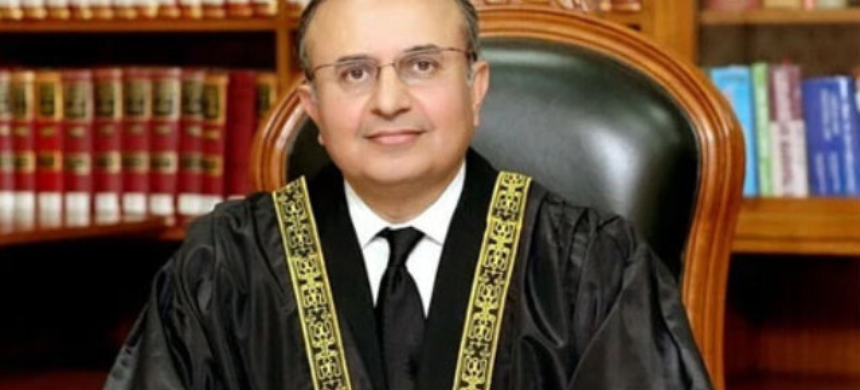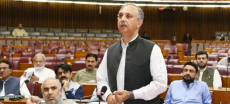Supreme Court senior puisne judge Justice Syed Mansoor Ali Shah has departed for the United States. He will engage in his annual academic commitments at Yale University, Harvard University, and New York University (NYU).
His visit takes place during the final week of the summer vacation. It includes a series of high-profile meetings and lectures.
Before arriving in the US, Justice Mansoor will meet with the law faculty of NYU, Abu Dhabi. They will discuss their online training program with the Federal Judicial Academy (FJA).
In the US, his engagements will start with a lecture on climate justice and human rights at NYU. He will then meet Professor Cesar Rodriguez to strengthen the ongoing partnership between FJA and NYU.
Justice Mansoor will participate in the Global Constitutionalism Seminar, 2024, at Yale University. This prestigious event is attended by supreme court judges from around the world.
Also Read: Supreme Court urges shorter detention for death row prisoners
The theme for this year’s seminar is “Judging in Times of Crisis.”
He is also scheduled to meet Professor Daniel Markovits at Yale. He will interact with Pakistani students studying there.
Further academic engagements include meetings with notable professors at Harvard University and Boston University.
He will address the South Asian Law Students Association at Harvard and meet with Pakistani students.
Justice Mansoor is expected to return to Pakistan on September 12, 2024. He will resume his judicial duties on September 16.
Following the retirement of Chief Justice Qazi Faez Isa on October 25, Justice Mansoor is next in line to become the Chief Justice of Pakistan.
However, the government has yet to issue a notification for Justice Syed Mansoor Ali Shah as the next CJP. Since the July 12 short order in the case of the reserved seats, Justice Shah has faced multiple internal and external challenges.
The detailed judgment in the reserved seats case is still pending. It is anticipated that the judgment will be released after Justice Shah’s visit to the USA. The judgment will likely be issued soon after his return, following the acquisition of signatures from other judges.
The government is working to reverse the July 12 order. It aims to secure a two-thirds majority in parliament for a ‘judicial package.’
Within the government, some factions are obstructing Justice Shah’s appointment as the new CJP. Others are seeking to engage with him to obtain assurances regarding the current political system’s functioning.
One week after the July 12 order, CJP Isa called for an early hearing of the review petition against the order. However, his request was rejected by a majority of 2 to 1 members of the committee. The reason cited was that the detailed judgment had not yet been issued, and the judges were on summer vacation.
On July 21, CJP Isa reconstituted the alternative dispute resolution (ADR) committee, which he had previously chaired. The case of Arshad Sharif’s murder was initially fixed before a bench led by Justice Shah without committee approval.
Subsequently, the matter was presented to the committee, which, by a majority of 2 to 1, established a larger bench led by Justice Jamal Khan Mandokhail.
Similarly, a supplementary cause list was issued for the fixation of two bail matters related to the May 9 accused before Justice Shah’s bench. The Judicial Commission of Pakistan (JCP) also appointed two ad hoc judges.
Justice Shah dissented from the nomination of one judge due to his recusal under social media pressure.
The government has begun using parliamentary forums against the majority judges following the July 12 order in the case of the reserved seats.
Amendments to the Election Act 2017 were made to counteract the effects of the short order.
Now, the government plans to increase the number of SC judges. A ruling party member is set to table a bill in the National Assembly soon.
Meanwhile, CJP Isa has written to all high court chief justices to initiate the appointment process for high court judges.
Lawyers are divided on whether CJP Isa should start the appointment process as his retirement approaches.
Advocate Umer Gilani believes that Justice Shah would be an excellent CJP. He would focus on internal judicial reforms.
Gilani added, “It also requires the judiciary delivering on its own job: dispensation of inexpensive and expeditious justice. This is something that’s been ignored since the lawyer’s movement. That’s what we expect CJP will focus on.”











